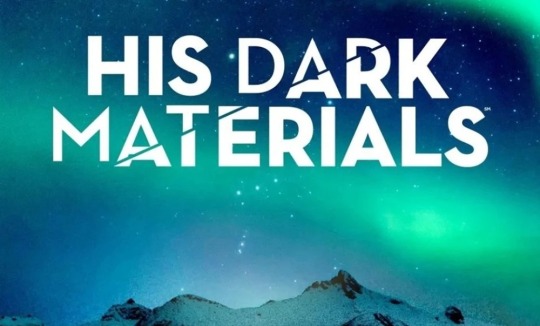#mr eko
Text
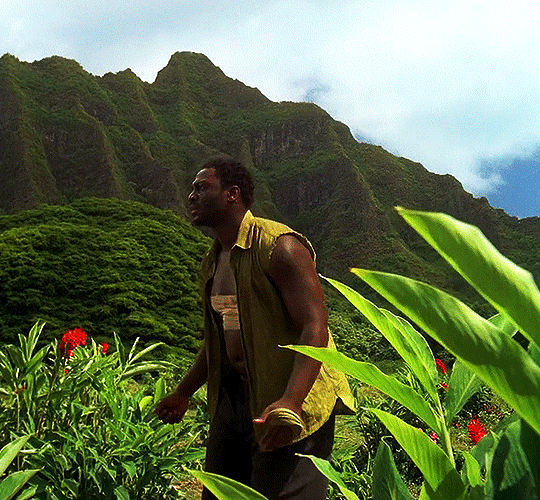

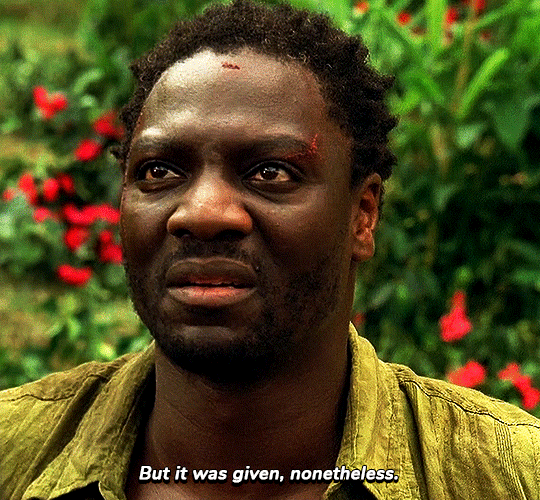

I ask for no forgiveness, Father, for I have not sinned. I have only done what I needed to do to survive.
#lostedit#lost#lost abc#lostdaily#dailyflicks#tvgifs#tvedit#cinemapix#cinematv#mr. eko#mr eko#adewale akinnuoye agbaje#the cost of living#*
203 notes
·
View notes
Text
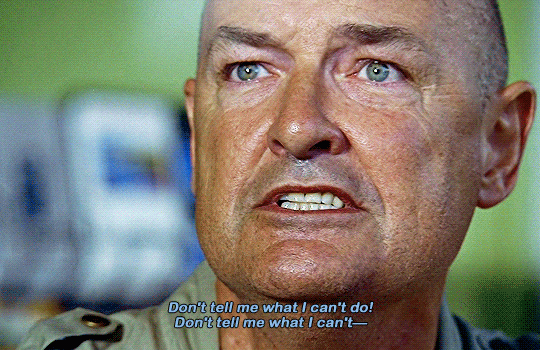
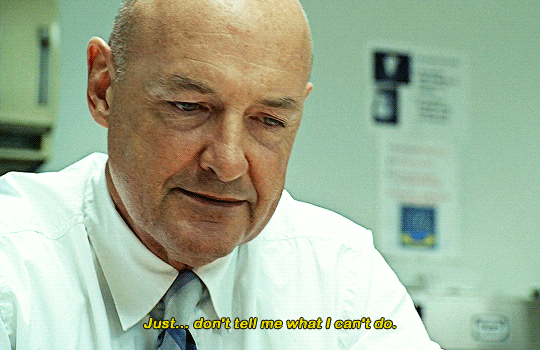
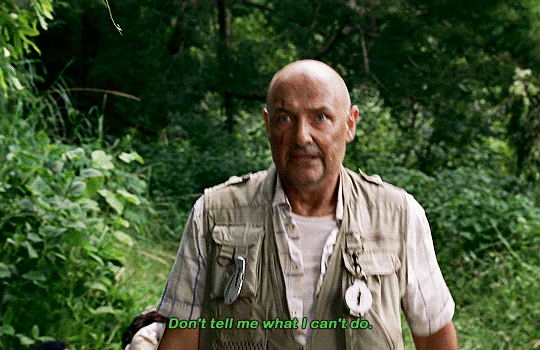
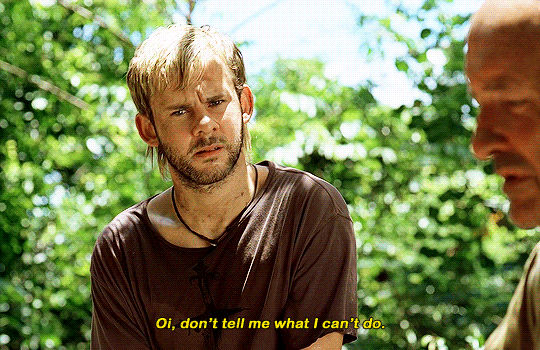
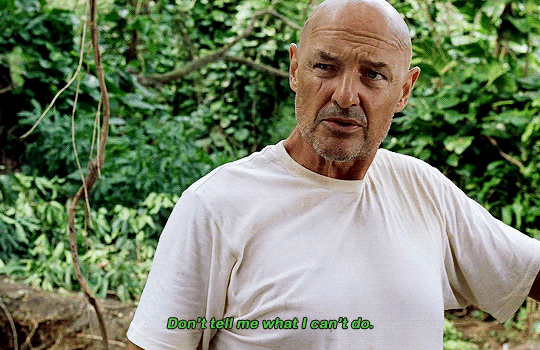
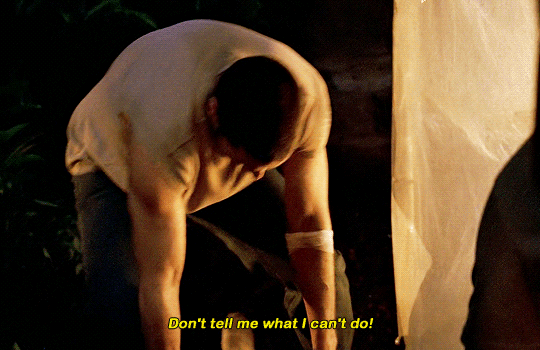
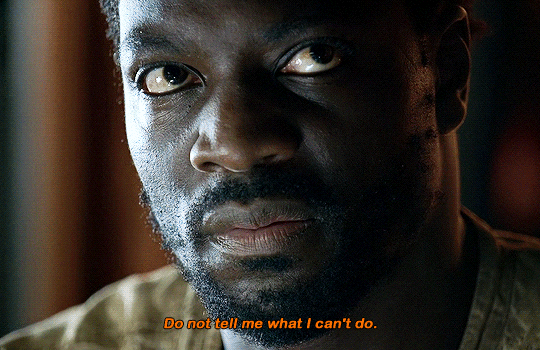
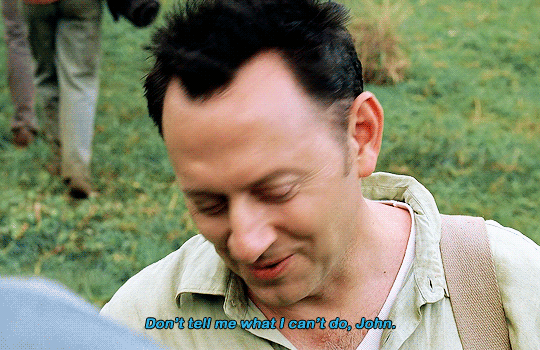
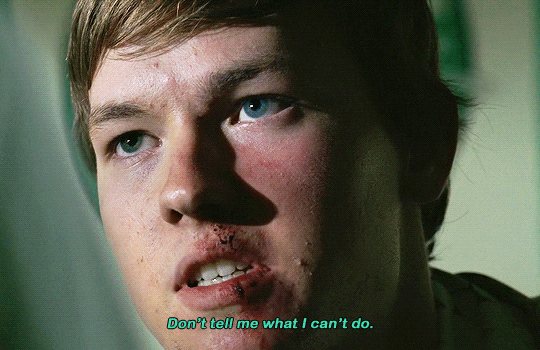
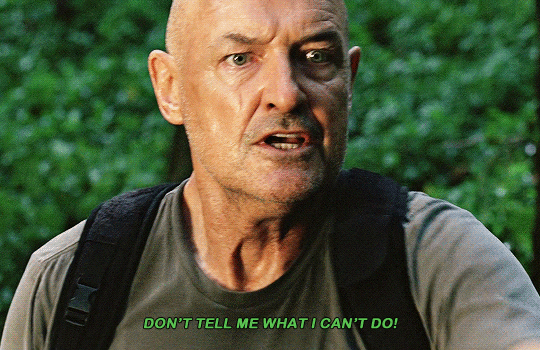
#lost#lostedit#tvedit#lost spoilers#john locke#benjamin linus#jack shephard#mr eko#charlie pace#man in black#nikolatexla#'don't tell me what i can't do' universe#i chuckled when ben said that#hope you like this anon
374 notes
·
View notes
Text
Actually no now I'm just thinking about how sad all of the deaths in lost are
#God#I don't even have words#It's such a fucking sad show#abc lost#lost abc#jack shephard#charlie pace#boone carlyle#sayid jarrah#juliet burke#daniel faraday#danielle rousseau#alex rousseau#ana lucia cortez#michael dawson#jin soo kwon#sun hwa kwon#eko lost#mr eko#john locke
9 notes
·
View notes
Text

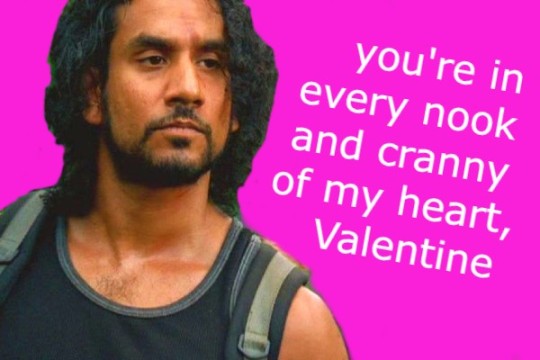
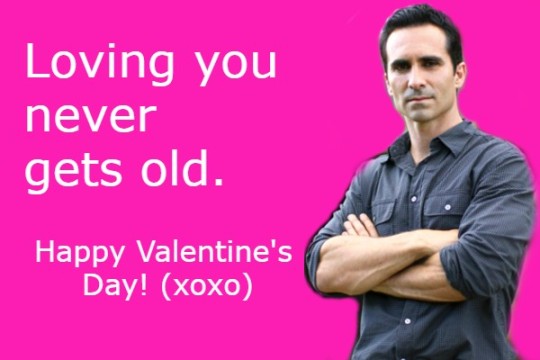

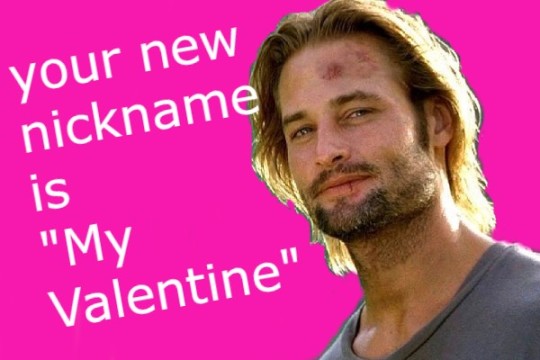
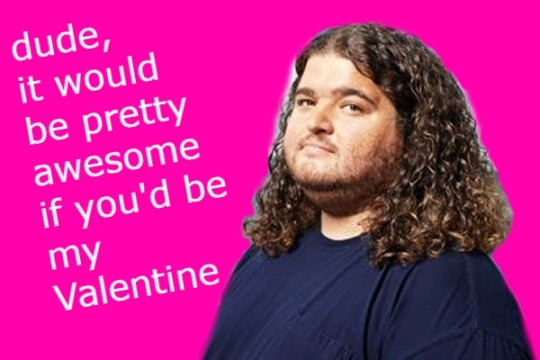
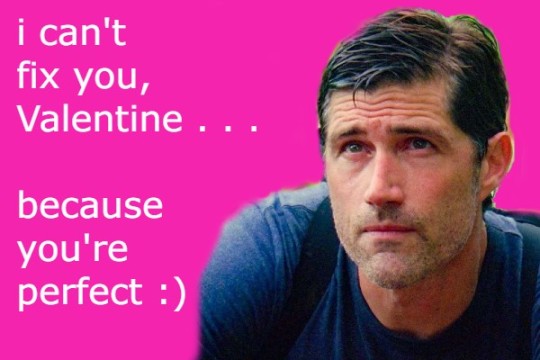
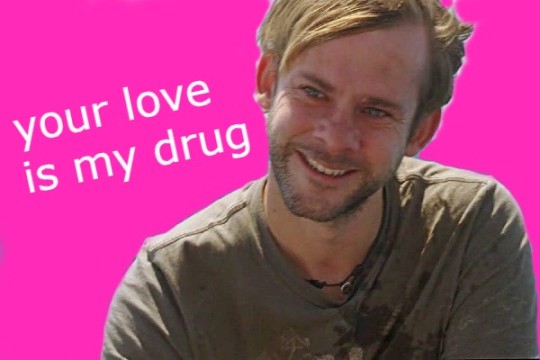
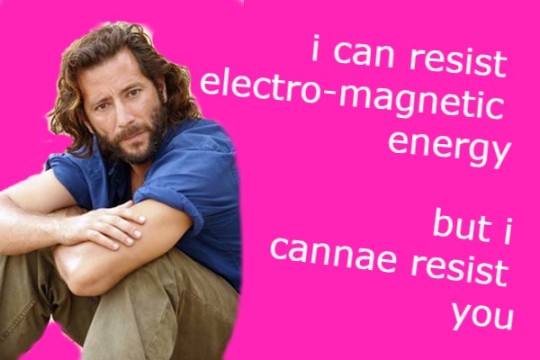

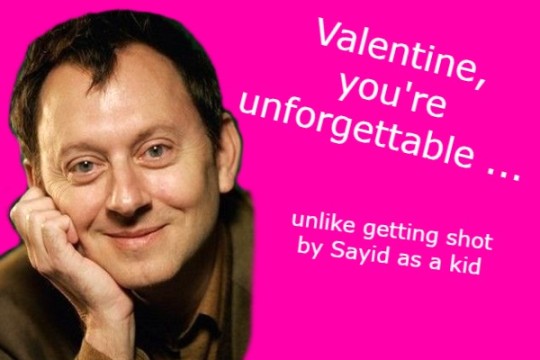

bonus:

#LOST#abc lost#lost valentines#valentines#happy valentines day#valentines day#john locke#sayid jarrah#ben linus#desmond hume#charlie pace#boone carlyle#sawyer#jack shephard#danielle rousseau#hurley#mr eko#richard alpert#i hope someone enjoys these#lost valentines no one asked for
11 notes
·
View notes
Note
Hello! I’m your LOST secret Santa! Could you tell me about your favourite character and why you like them?
Thanks!
Hi, I'm sorry for late reply but I'm out on a trip rn!!
So, I could say that I have three fav characters; Sayid, Mr Eko and Ben.
I like Sayid bcs he's both so perfect and imperfect. He's literally the most beautiful man on the whole island who respects women and always has right opinions (let's ignore his past, okay 🤪). What is fascinating for me in his character, that I can very easily read him from his face and body language and as an autistic person, most of the time I find it incredibly hard. (Maybe it's time to slap another autism headcanon on my fav character 😆).
He's beautifully soft, caring and emotional, very intelligent and knows his shit about things. I very much have instinct to protect this man at all cost, though I know it would probably be the other way around 😆😆😆
I also very often find it fascinating when a character has a dark past although clearly being a good person and still struggling with some horrible stuff (let's ignore what they did to him in season 5/6 😭😭😭). It's like... the nuance, mixed emotions and lots of space to do some tasty psychoanalysis 👁👁 In the end, we see what his character is about and it's very much about how sOFT and caring he is to people he loves, he just wants to protect them ;u; But he was forced by war to go to extreme measures to survive and he is stuck with this survival mode and trauma for a long time, as people with pstd are.
He's a lovely friend, partner and ally to have and I like to headcanon him to be on the ace spectrum, like demisexual and biromantic (just my personal little headcanon 🤭). Idk, he's just neat 🤲💖
When it comes to Ben, I love how horrible he is, it fascinates me without the end 😆😆 He's clearly someone who has ptsd and might be autistic with some absolutely horrible coping mechanisms and jealousy problems. He's pathetic in a way that makes me hooked, whenever we find some humanity behind all of that and someone yET again gives him another chance (as they usually shouldn't, but I would do the same because I am delulu). The part in the finale in afterlife, when he was in this ridiculously adorable teachers AU with Locke made me love him even more, bcs it showed what kind of person he could be, if all of this bad stuff with island wouldn't happen. I love to headcanon him as autistic and gay aroace or asexual gay or just gay. He clearly would have many little passions if he wouldn't be occupied with the island bullshit and his ptsd. He's clearly a father at his very core, the one that is not rotten with fear and jealousy. He seems to just care sm for others in this AU. (And he clearly would have some interesting close friendship with Locke with nice sprinkle of gayness 👀)
Normally he's a horrible person with tragic story but I am a Benjamin Linus apologist 100%, love that he got his little redemption arc at the end and got domesticated by Hurley 😆 He might as well get it after all this mess and trauma with island and Jacob vs Black Smoke bullshit, like wHY not
The third option is Mr Eko and his incredibly relatable struggle with religion. Again, another character that I headcanon as autistic, like VERY much. The way he perceives world and communicates 🤌 I'm always weak for character whose stories are about survival, trauma and like in this case, religious trauma. Even though myself I came out in the end to be agnostic, I admire his strength to stay spiritual and become a priest. He's someone who's strong and someone to look up to for advice. Though, he shouldn't have to be forced to be so strong by awful trauma he went through.
I absolutely LOVED the way he perceived his spirituality and concept of sin. The way he said he asks for no forgiveness, because he only did what he did to survive. And that struck me, I was like WOAH, THAT'S IT. I am really sad that his character was killed off and we never saw where they would go with it, it would be so sO interesting. A badass priest with awfully dark past 🤌 His attachment to brother is very relatable to me too. And yet again, another aroace headcanon 😆
Anyway, sorry for long ramble, hope that helps a bit!!!
7 notes
·
View notes
Text

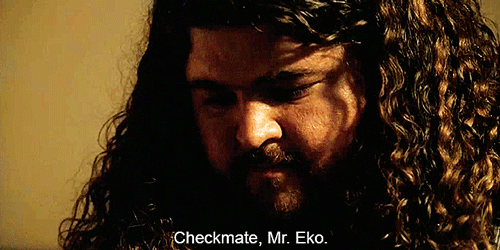

Every Afictionados Best Line Award (Robyn)
LOST Episode 414: There's No Place Like Home Part 3
by the Afictionados Podcast Network
#hurley reyes#hugo reyes#mr eko#eko tunde#lost#afictionados#best line award#episode#414#there's no place like home
2 notes
·
View notes
Text
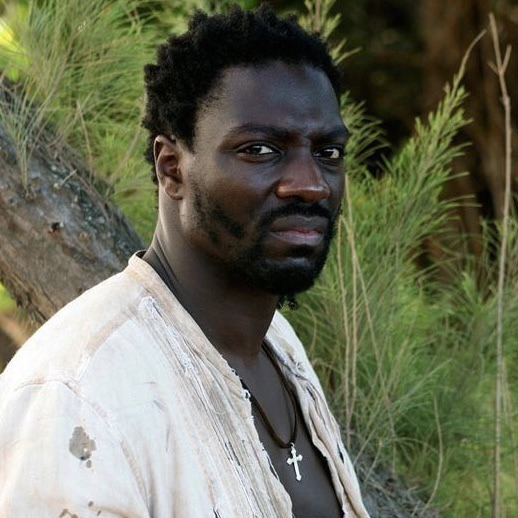

#hello i love him <3#mr. eko#mr eko#eko tunde#adewale akinnuoye-agbaje#lost#lost abc#abc lost#lost fmk polls#my posts#my polls
11 notes
·
View notes
Text
LOST Character Tournament: Round 1 Part 3

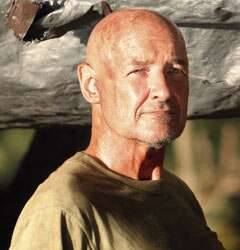
17 notes
·
View notes
Text
Lost episodes 2.03 "Orientation", 2.21 "?", and 2.24 "Live Together, Die Alone Part 2"
Despite having the worst title sequence I’ve ever seen in my whole entire life, Lost is really very special. It’s affirmed how much I love things that are bizarre and spiritual with a sprawling yet intimate ensemble cast. The amount of people they managed to cram on this island is truly crazy, as is its incredibly rich, decades-long history. I love everything about Lost, but what I love most is the hatch, which really had its moment to shine in season two, although of course the implications of what happened there reverberate throughout the series.
John Locke and Boone spend much of season one excavating the underground metal bunker that they and everyone else comes to refer to as ‘the hatch’. First of all, the way this show normalized its own verbiage and experimental plotlines is incredible to me. The amount of times I heard “I gotta go back to the hatch” without ever thinking anything of it, but then realized I couldn’t even begin to explain what was going on to someone who hadn’t been along for the ride. Lost was so itself.
John got pretty obsessed with the hatch as he and Boone tried and failed to get it open. It was only when Rousseau came to the beach and warned the camp of an impending attack from the Others that more people got involved with attempting to get the hatch open- namely Jack, Kate, and Hurley. The group got some dynamite from The Black Rock to blow it open, but at the moment of truth Hurley noticed the numbers embossed on the metal- his numbers, his cursed, evil numbers. He frantically tries to stop John from blowing the hatch open, which only proceeds to make John hurry the fuck up. I was John’s biggest fan in season one, but this was where I first started to see some cracks in his philosophy and motives. You’d think a man of faith would want to hear about these evil numbers, so that begs the question, what is it that he has faith in, exactly?
What’s actually in the hatch proves to be even more interesting than the shrouded mystery of an unknown underground structure. Desmond Hume is down there, on the fringes of sanity from three years of isolation and getting no more than two uninterrupted hours of sleep. Desmond, who, it turns out, has met Jack in LA (in another life), shipwrecked on the island while attempting to sail around the world. After coming ashore, he was brought into the hatch by a representative of the Dharma Initiative, who has since died. Desmond has since assumed the representative’s task of entering those fateful numbers into an ancient looking computer every 108 minutes. If he doesn’t, the world will end. Or something to that effect. He’s not exactly sure.
In episode 2.03, “Orientation”, Jack and John discover and view the Dharma Initiative orientation film that gives them all the same information that Desmond has, which really isn’t much. The film has clearly been spliced in places, with sections missing, but the ominous gist is this:
“Welcome. I’m Dr. Marvin Candle, and this is the orientation film for Station Three of the Dharma Initiative. The Dharma Initiative was created in 1970. Following in the footsteps of BF Skinner… imagined a large-scale communal research compound where scientists and free thinkers from around the globe could pursue research in psychology, parapsychology, electromagnetism, and utopian social… whose financial backing made their dream of a multipurpose social science research facility a reality. You and your partner are currently located in Station Three, ‘The Swan’…
“Not long after the experiments began, however, there was… an incident. Since that time, the following protocol has been observed. Every 108 minutes, the button must be pushed. From the moment the alarm sounds, you will have four minutes to enter the code into the microcomputer processor… Do not attempt to use the computer for anything… Congratulations!”

Matthew Fox and Terry O'Quinn in "Orientation". Image courtesy of IMDb.
John wins me back for a moment here by voicing my exact thought: “We’re gonna need to watch that again”. Jack, on the other hand, surprises me by how viscerally he rejects everything he just saw. The two men are incredulous at each other’s reaction to the film, and in this moment, I’m on John’s side. And ultimately, as much as he fights it, Jack is too.
The question that Jack furiously insists be answered isn’t even if the button is real, but why Desmond and John so readily believe that it is. When Jack first asks if Desmond really believes this is happening, he replies, “Why wouldn’t it be?” Sayid, who was brought down to the hatch to fix the broken computer that is still counting down, feels similarly: “All I need to know is that that timer is counting down to something, and that this computer needs to be repaired.” Jack is mystified by everyone else’s participation and pushes on:
“It says ‘Quarantine’ on the inside of the hatch to keep you down here, keep you scared. But you know what? We’ve been up there for over 40 days, and no one’s gotten sick. You think this is the only part of it that’s true? Did you ever think that they put you down here to push a button every 100 minutes, just to see if you would? That the computer, the button, it’s just a mind game? An experiment?”
While Desmond and Sayid fulfill what they see as an odd but important duty, John eats this whole thing up with a soup ladle in a different way. Desmond answers Jack’s question by admitting that he thinks about this possibility every single day, and even hopes that it’s true, but won’t risk blowing up the island. But just as John’s desire to open the hatch was clearly not rooted in saving the group, so too does he not push the button to save lives, but rather because he is confident that his pushing the button is part of his walk on a predestined divine path for which he will ultimately be rewarded.
Where Desmond and Sayid give the loyal, but reality-based responses of “I dunno about you, brother, but every time I walk past that wall out there, my fillings hurt,” and “I’m sure you’ll tell me why once I’ve [fixed the computer]”, John practically joins the Dharma Initiative right then and there:
JOHN: You saw the film, Jack. This is a two-person job, at least. It’s a leap of faith, Jack.
JACK: Some man takes you down here, shows you a movie, and you push a button on faith alone? Nothing is going to happen!
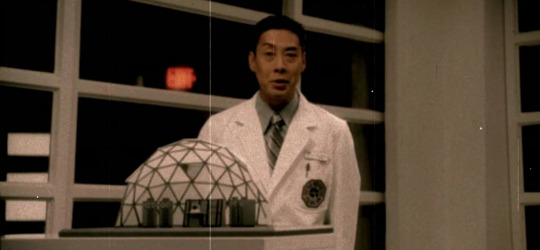
François Chau in Lost. Image courtesy of IMDb.
This is John’s worst quality, but I think at this moment it has a positive impact. Whatever John decides to do, the whole group has to do it. If he wants to push the button, everybody has the push the button. If he wants to stop, everyone has to stop. If he wants to stay on the island, he blows up the submarine so nobody can leave.
But at this moment in time, Jack needed to be put on the spot… and with seconds to spare, he pushes the button. Little does anybody know, Jack is actually the one on a divine path, and this is his first step on a journey that will end with him being the one adamant about destiny and what he’s “supposed” to do.
John seems like a man of conviction, but his belief system is actually incredibly fragile. I honestly just feel kind of sad for him, but my sympathies only go so far as he continues to make the same mistake over and over again. He puts all of his beliefs, faith, and livelihood into things outside of himself and is repeatedly left utterly lost when those things don’t care about him as much as he cared about them. On the mainland it was his father and the marijuana grow house community, on the island it was the hatch, the button, and then the nebulous character of “the island” itself. He’s the definition of a servant, and I appreciate what his ultimate fate suggests about living a life without independent thought.
In line with this behavioral pattern, John’s belief in the button, and subsequently his belief in himself, is shattered in 2.21, “?” (sick episode title also). In this episode, John begrudgingly helps a born-again Mr. Eko follow his dreams (literal dreams) to something he believes the island wants to show him. John’s impatience for anyone else’s faith-based escapades is another trait that annoys me, but it aligns perfectly with who he is- no one but him should be receiving any special treatment from the universe.
John and Eko discover yet another hatch (there are a few, it turns out), and yet another orientation film, not to mention a wall of screens that reveal that their hatch is under surveillance.
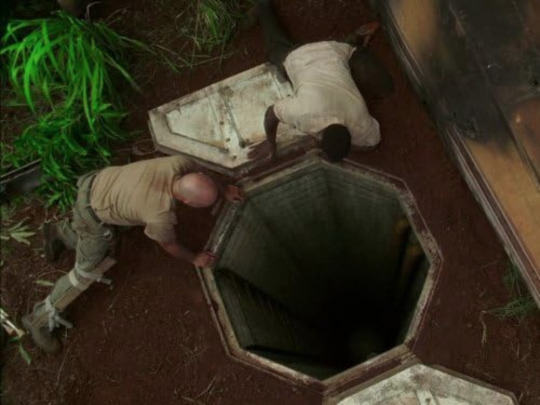
Terry O'Quinn and Adewale Akinnuoye-Agbaje in "?". Image courtesy of IMDb.
“Station 5, or The Pearl, is a monitoring station where the activities of participants in Dharma Initiative projects can be observed and recorded… your tour of duty in The Pearl will last three weeks, and during this time you will observe a psychological experiment in progress. Your duty is to observe team members in another station on the island. These team members are not aware they are under surveillance or that they are subjects of an experiment. What is the nature of the experiment, you might ask? What do these subjects believe they are accomplishing? All you need to know is the subjects believe their job is of the utmost importance. Each time a notebook is filled with the fruits of your diligent observation, roll it up and place it in one of the containers provided. Then simply place the container in the pneumatic tube and presto, it will be transported directly to us.”
This time, when Eko asks John if he’d like to see the film again, he most certainly does not. He’s completed deflated. Eko, interestingly, is invigorated, feeling more called to push the button now than ever. The possibility is raised that there’s no way to know how deep the layers of experimentation go- maybe the observers are in fact the ones being duped into a useless task. John doesn’t care anymore:
JOHN: I’m sorry, weren’t you just watching the same thing I was?
EKO: Yes, John, and I believe the work you have been doing is more important now than ever.
JOHN: What work?
EKO: Pushing the button.
JOHN: That’s not work. That’s a joke. Rats in a maze with no cheese.
EKO: It is work, John. We are being tested. The reason to do it, to push the button, is not because we are told to do so in a film.
JOHN: Oh, well, then, what is the reason, Mr. Eko?
EKO: We do it because we believe we are meant to. Isn’t that the reason you pushed it, John?
JOHN: I was never meant to do anything. Every second of my pathetic little life is as useless as that button. You think it’s important? You think it’s necessary? It’s nothing. It’s nothing. It’s meaningless. And who are you to tell me that it’s not?
This should have been an eye-opening moment for John. While I agree with Eko, John was also right about himself and had some important realizations- but not quite enough. He has had a pathetic little life, but that’s exactly because he is happy to be a rat, so long as there is cheese. While Desmond accepted his bleak life’s purpose of pushing a button forever to thanklessly save the world over and over with no expectation of getting anything in reward, John was only doing it because he believed some unknown entity would be pleased with him.
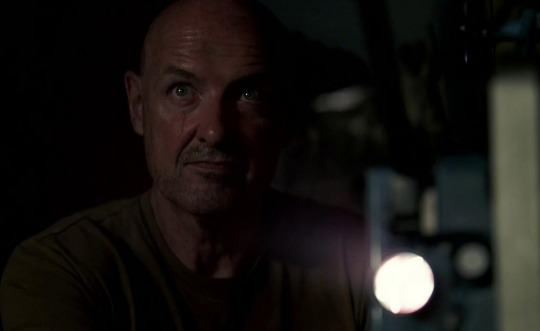
Terry O'Quinn in "Orientation". Image courtesy of IMDb.
I don’t blame John for wanting to stop pushing the button here, but instead of refocusing his energy on finding what he is meant to do, he rededicates himself to making everyone else stop pushing the button. Where Jack had the attitude of “push it yourself”, John is full of spiteful rage and wants to let the timer run out to stick it to… the seemingly extinct Dharma Initiative? It’s unclear. But the group, particularly Eko, has now committed to pushing the button. They’ve started taking shifts, they’ve built a routine around it. “Live Together, Die Alone Part 2” is all about John and Eko’s battle over the button- and the looming question of it it's real.
As much as John’s behavior bothers me here, I absolutely love that we get a concrete answer to if the button is real- and we wouldn’t have had they never stopped pushing it. In “Live Together, Die Alone Part 2”, John barricades himself in the room with the button, bringing impenetrable walls down around him to ensure no one stops him from letting the timer run out. Eko, determined to push the button, gets more dynamite from The Black Rock (this becomes a common errand) to blow the doors open. He detonates the dynamite as the timer counts down, but it doesn’t have the desired effect and he doesn’t make it to the button.
The hatch starts to shake, metal flies across the room as electromagnetic energy escalates. They didn’t push the button, and something happened. The exact something that Desmond predicted. Now poring over the reports Eko brought back from the Pearl, Desmond frantically realizes that the one time he ever failed to push the button was the same day Oceanic 815 crashed on the island. While we’re warned throughout this show not to mistake coincidence for fate, everything happening in this moment confirms: not pushing the button crashed their plane. The button is real.
Desmond, who has a fail-safe key from his old Dharma companion, crawls through some tunnels to turn it, a self-sacrificing mission that sends the full release of electromagnetic energy inwards. The impact reverberates throughout the island, but only the hatch implodes. The presence of electromagnetism on the island and Desmond’s fateful missing of the button/inadvertent crashing of the plane will continue to be a driving force of Lost’s action, but this is the end of the hatch as we know it.
And perhaps most interestingly of all, no one really cares. The hatch had a shower, a washer/dryer, and multiple beds, all of which seemed to be rarely used. In fact, it seems that many of the survivors of Oceanic 815 never even went in it. The food stockpile Desmond was living off of was freely distributed to the camp with no attempt to ration it. No one bemoans returning to sleeping on a tarp and doing laundry in the waterfall. This attitude is telling. As much as some characters are adamant about getting off the island, the happenings here are much more significant than mere survival, and on some level, everybody knows that.
I love all of Lost, but the story of the hatch is easily the most compelling, and the ideas batted around in season two hold many of the show’s key takeaways, which are revealed more bluntly in season six.
On that note, I wish I had more to say about the show’s ultimate conclusion. I liked it!
I was compelled to watch this show because I found all the discourse surrounding the series’ controversial ending so interesting, but as I was promised by a friend, I found it emotionally fulfilling and sound. The finale is comparable to those of Six Feet Under, The Leftovers, and The Good Place, which is great company to be in, but I do think those other shows’ conclusions are a little stronger.
However, I think that has more to do with Lost’s middle than it does its end. Lost never lost me (haha), but I’ll admit the end of season four and beginning of season five was a little manic. For the show’s ultimate message to be something so ancient, spiritual, and utterly simple, they sure spent a lot of time filling my head with quantum physics and generations worth of interpersonal alliances and rivalries. I was still working out what exactly Ben Linus and Charles Widmore were fighting about when the show told me that they don’t really matter at all.
I love Lost’s finale more and more the longer I sit with it, but in the moment my head was so cluttered with timelines and science and the momentum of the mission in the that it was hard to really feel the full extent of its serenity. I’ll defend it vigorously today, but I wasn’t as stunned, mouth open while the credits rolled as I was with Six Feet Under, The Leftovers, and The Good Place.
All this to say, talk to me about Lost! I think it’s the most interesting thing in the world at the moment.
#lost#desmond hume#john locke#jack shephard#mr eko#matthew fox#terry o'quinn#adewale akinnuoye-agbaje#sawyer#james ford#tv review#tv criticism#tv#henry ian cusick#damon lindelof
1 note
·
View note
Text
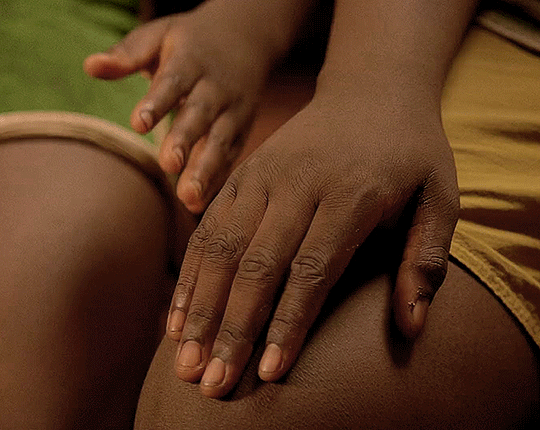
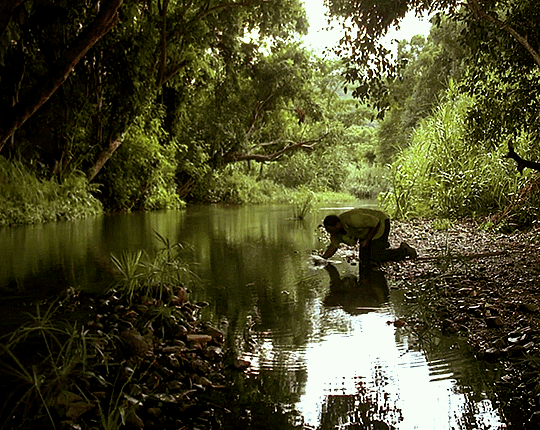
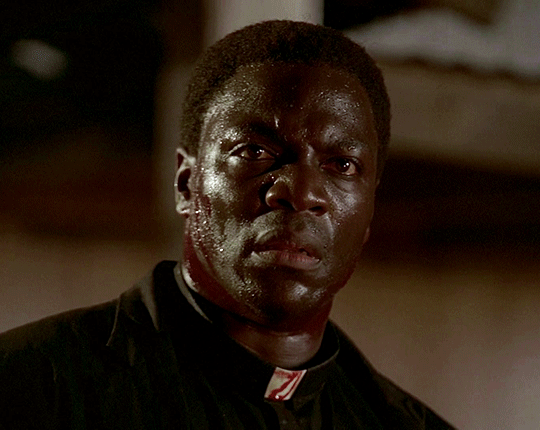

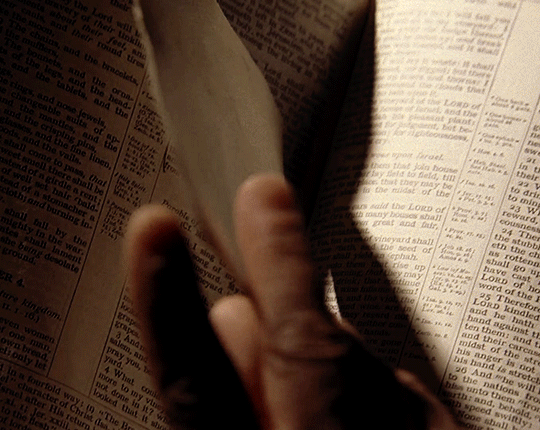
LOST (2004-2010)
S3E5 - The Cost of Living
#MISTAR EKOOOOOO#mygifs#lost#lost abc#abc lost#mr. eko#adewale akinnuoye-agbaje#update i rly hate the coloring of this gifset lmfaoaoa ill redo it one day
100 notes
·
View notes
Text





#lost tv show#lost#lost meme#lost abc#abc lost#mr. eko#claire littleton#james ford#sawyer ford#aaron littleton#shannon rutherford#danielle rousseau#ana lucia cortez
60 notes
·
View notes
Text
mentioning LOST's church ending got me riled up about the racism in LOST again lol. i obviously am aware that some actors just did not return to production for possibly other reasons, but also especially in the case of harrold perrineau (michael dawson) he felt like his character (and walt, his son) was treated like shit by the writing. and he was absolutely right. i've already made posts about this (will try to dig them up later), but michael was treated absolutely bullshit and unfairly wrt the story. michael betrayed them and killed two people, yes, but what did he do it for but to protect his son? he felt like nobody gave enough fucks about walt and there was some truth to that claim. his whole character arc is about being a dad to walt and their improving relationship over the course of being stuck on the island, so of course he would do that. it just makes sense.
which is why i don't think it's all that fair to punish him for it immensely in the narrative. harrold perrineau said it himself that he didn't want michael and walt to be another case of the absent black father stereotype [citation needed, i'll look for it but he said it in an interview] yet that's what he ended up being anyway. after his and walt's escape from the island, apparently walt cast him away because he doesn't agree with what his father did—which i actually think its interesting to explore: walt disagreeing with michael's actions and trying to grapple with it, but i don't think separating him from his dad was the best writing choice to make. walt is being punished for caring about his son by making his son be the one to cast him away. you can argue it's supposed to be tragic, michael is supposed to be a tragic character, but with the context surrounding michael's character? there's better ways to make his character be tragic than this.
which brings me to his next punishment. i was happy to see michael again on the kahana (just happy to see him in general), but it didn't last long when he gets killed, sacrificing himself to prevent/prolong the kahana's explosion from happening. (put a 📌 on this bc it's similar to how sayid dies and we'll come back to that later.) michael dies here and walt doesn't know about this. and then michael joins as part of the whispers, his soul trapped on the island (presumably forever) and that's why he's not in the church ending.
i'm gonna be frank. michael being trapped on the island because of his guilt or remorse or perhaps repenting for his sins is just bullshit to me. a lot of characters seen in the flash sideways and in the church ending are characters who've done "bad things". it's bullshit to have michael be the only one doomed to pay for his misdeeds forever. his misdeeds for... killing two people. not that killing two people is Nothing, but moreso if you examine the circumstances it's hardly anything to be damned eternally for.
remember the 📌 we had wrt sayid and michael? both of them died trying to prevent an explosion from reaching everybody else. which makes this more egregious imo. i can say 1000 things about sayid's arc (points to url), but this is about michael and not him, so i'll just focus on this: sayid was grappling with "being a bad person" for torturing and killing so many people. he worked as an assassin for ben. and yet, somehow, you're telling me sayid is not being damned eternally for his misdeeds but michael is? if you don't see the BS in that i don't know what to tell you.
i'm also aware why some characters don't appear any more re:conflicts with their actors (or just availabilities or other reasons for declining to come back), but even then arguably any conflicts with harrold perrineau stemmed from a justified place because of how michael was treated.
i think mr eko had a more dignified arc (he's one of my fav characters, thematically speaking) and honestly he had some of the rawest shit i've ever heard:
I ask for no forgiveness father for I have not sinned, I have only done what I needed to do to survive. A small boy once asked me if I was a bad man, if I could answer him now I would tell him, that when I was a young boy I killed a man to save my brothers life. I am not sorry for this, I am proud of this. I did not ask for the life that I was given but it was given none the less, and with it I did my best.
but despite this it doesn't change the fact that his absence in the church ending is very noticeable. he had meaningful connections with charlie, with locke, and interestingly like michael he kind of parallels sayid but this time thematically through their arcs. sayid is constantly burdened with feeling like he's a bad person and resigning to it as some sort of self-fulfilled prophecy, but mr eko is very firm about how he sees himself as not necessarily a bad man, just a man whose hands were forced because of the cards he was dealt. i wish we could have seen a more direct parallel between them, because it would've been interesting. back to the main point: i think it's such a missed opportunity for mr eko to not be here. especially since even after his death, hurley was able to communicate with his ghost, showing that he still had connections with his fellow losties even long after his death.
ana lucia being "not ready to move on" is interesting. but ultimately you can't help but raise a few eyebrows at it anyway. you can argue that, unlike mr eko she died an unresolved death, but most of the LOST characters died with an unresolved death. (she was killed early.) that's the whole point of the sideways segments. so what makes ana lucia so different from the others? yeah she killed shannon, but that was completely a freak accident. her people (the tailies) were being picked off one by one by the other so she was understandably on edge. she was kind of a hated character but i think a lot of it is just racism and misogyny combined tbh. (LOST is...notorious for a lot of misogynistic character writing decisions.) ana lucia was just as complex and morally "ambiguous" as the rest of them. i find the decision to make her corrupt in the sideways segments interesting (negative). cz like, there was never any indication she was like this in real life. what does that corruption symbolize? because obviously that corruption is a key to why she "can't move on yet". what exactly is she supposed to be repenting for? they hinted at a possible direction her arc is going towards before killing her off, ie. her ultimately choosing not to kill "henry gale" because she no longer wants blood on her hands. again, in a way, she's just like sayid! someone who decided they'd turn away from ceaseless violence. only right afterwards she got killed. so what does she need repenting for so much that she's left out of the church ending? much to think about.
i don't really know how to conclude this post. but my main point is that the lack of these characters during the church ending is and has racist implications. (again, i understand the casting issues, but it's still a writing decision you can critique as a viewer at the end of the day). i'll try to find the old posts i made last year abt michael and mr eko and their parallels to sayid and link them here (and self reblog).
edit: go read/look up "burn it down". it details a lot of the behind the scenes mistreatment of the staff (including racism and sexism), including actors and writers. the quote from an interview from harold perrineau that i mentioned was also linked in a reblog. (post link)
#op#lost#lost abc#abc lost#lost 2004#<- have we agreed on a main tag yet#michael dawson#mr. eko#ana lucia cortez#meta#analysis#media analysis#church ending#//#lostposting#<- my tag for LOST rambles on this blog
72 notes
·
View notes
Text

Lost Tarot Cards: Mr. Eko as The Priest.
Armed with a ‘Jesus stick’ carved with Bible verses, the soft-spoken Eko serves, for a time, as a spiritual leader to the survivors of Oceanic Flight 815, building a makeshift church and doling out wisdom with either a scowl or a sweet smile. While certainly not without sin, Eko's own bitter experience with faith and doubt make him a wise man often capable of seeing past appearances and looking true darkness in the eye without fear.
20 notes
·
View notes
Photo


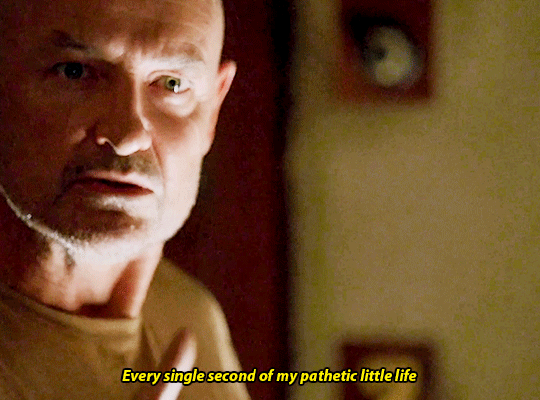

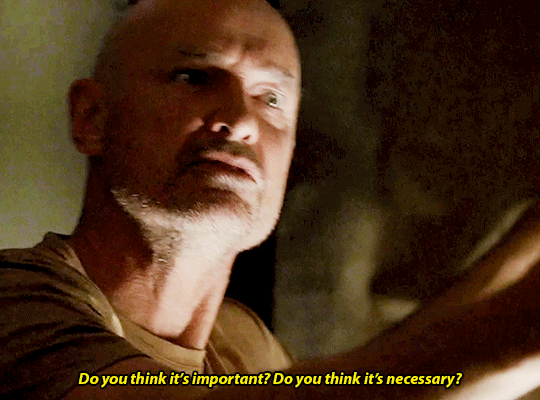

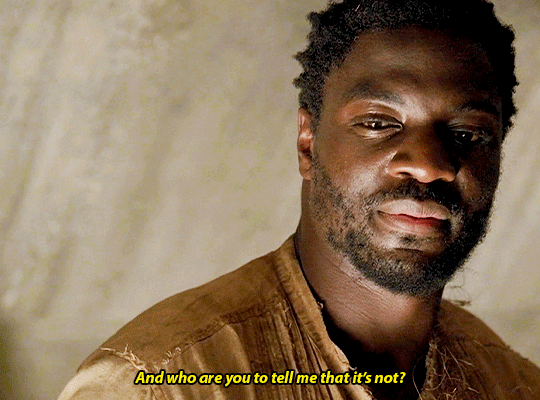
“The reason to do it - push the button - is not because we are told to do so in a film.”
“Oh. Well, then, what is the reason, Mr. Eko?”
Lost 2x21: ?
#lost#lostedit#lostabc#lost abc#john locke#johnlockeedit#mr. eko#tvedit#usersource#useroptional#tvfilmsource#filmtvcentral#dailytvfilmgifs#usertelevision#tvcentric#elyse.gifs#he's literally the saddest character ever written. fight me.
171 notes
·
View notes
Text
Will forever be upset that there's no fandom for Eko. Yes, I love all the regular fan favorites, BUT EKO IS THE LOVE OF MY LIFE
12 notes
·
View notes
